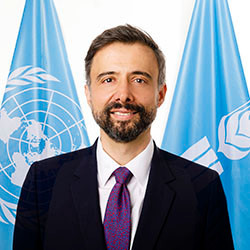G20 Agriculture Ministers Meeting - Plenary Session: Sustainable Agriculture for Food Security and Nutrition
IFAD Asset Request Portlet
ناشر الأصول
G20 Agriculture Ministers Meeting - Plenary Session: Sustainable Agriculture for Food Security and Nutrition
Statement by Alvaro Lario, President of IFAD
من Alvaro Lario
موقع: Hyderabad, India
16 يونيو 2023Check against delivery
Excellencies,
My thanks to the Indian Presidency and the city of Hyderabad for hosting this vital meeting.
Global hunger and food insecurity are pressing global issues that must not be overlooked. Freedom from hunger is a fundamental right for every person on earth. Yet, over seven hundred million children, women, and men suffer from chronic undernourishment. This is unacceptable.
Climate change, conflicts, pandemics, and depleted natural resources have intensified this dire situation. And crippling debt hinders the ability of many governments to invest in development. After years of underinvestment in food systems, we are losing the battle against rising hunger.
Yet the goal of achieving zero hunger by 2030 still remains within our grasp. Climate-smart technologies, improved resilience, and nature-based solutions, are proven ways for farmers to produce more food, even in the face of drought and climate change.
To realize this potential, there is an urgent need to invest in rural populations and small-scale farmers. Now.
Allow me to share three compelling reasons:
First, the vast majority of the world's hungry people reside in the rural areas of developing countries. By prioritizing investment in these regions, we can directly address the root causes of hunger.
Second, small-scale agriculture serves is the backbone of rural livelihoods for hundreds of millions of people.
Third, over 3 billion rural people depend on small farms for their sustenance. Not only are these farms efficient, but they also have a minimal ecological footprint, preserving biodiversity and providing habitats for diverse plant life, insects, and pollinators.
At IFAD, we have witnessed first-hand the power of rural people to transform food systems and improve food security. To unlock their full potential, stronger partnerships with the private sector are essential. The challenges of underdeveloped rural areas are more than offset by the vast business opportunities. Recognizing this, last month in Miyazaki, the G7 Presidency assigned IFAD lead responsibility for an initiative to strengthen G7 private sector engagement with small-scale producers in developing countries.
Investing in resilience is not only the morally right thing to do; also it is also economically prudent. Pro-actively addressing problems costs significantly less than responding to emergencies. Every dollar invested in long-term resilience can save up to ten dollars in future emergency aid.
Excellencies,
Just as in 2008, your leadership is once again needed to tackle the underlying causes of global hunger. We need investment to improve rural infrastructure, access to markets, and agricultural productivity. We need urgent investment in practices that preserve natural resources, and help farmers adapt to the impacts of climate change. We need adequate training for farmers, and we need fair and equitable trade policies.
We must break the vicious cycle of crisis and hunger. With the right investments and support, it is not too late to achieve a hunger-free world. IFAD stands ready to support.
